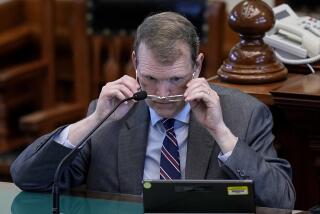Attorney to Testify Against S&L; Client : Trials: Prosecutors say CenTrust chief David Paul lost lawyer-client privilege when he tried to launder funds through the thrift’s law firm.
- Share via
MIAMI — Sanford Bohrer was one of many attorneys who represented CenTrust Bank Chairman David Paul in his battles against regulators, but he was the only one compelled to testify in the millionaire’s fraud trial.
Prosecutors stepped into choppy legal waters to put Bohrer on the stand in the 71-count federal case against Paul, who presided over one of the nation’s worst thrift failures, costing taxpayers $1.7 billion. Paul is accused of looting Miami-based CenTrust and spending the funds on his homes and yacht.
Some criminal defense lawyers say government prosecutors and banking regulators, in their drive to close the book on the savings and loan debacle of the 1980s, are running roughshod over attorney-client privilege.
“It’s a battlefield that will never go away, and it all depends on whether you give more emphasis to getting the truth out at trial or to confidentiality,” said Charles Wolfram, a professor of legal ethics at Cornell Law School.
Lawrence Goldman, a director of the National Assn. of Criminal Defense Lawyers, added, “It’s like a single-priority system; the priority is to convict.”
Normally, attorney-client privilege can be waived only by the client. But federal prosecutors contend Paul voided that right when he tried to launder $200,000 through Bohrer’s law firm after regulators froze his assets. Bohrer was away from Miami when the money was placed in his firm’s trust account and the lawyer gave it back when he returned.
Under precedents dating back to the 1800s, attorney-client confidentiality can be voided when attorneys are involved in a crime or when their legal work is used without their knowledge to further a crime.
Still, the exact reasons for the order requiring Bohrer to testify remain unclear. U.S. District Judge Donald Graham has sealed his ruling and other documents on the issue.
Paul faces three charges over his dealings with Bohrer: two counts of perjury for saying in affidavits that he had no money overseas and one count of obstructing the regulators who froze his accounts.
Bohrer, who is due on the stand this week, has maintained a neutral position on his testimony, saying he has not had access to the ruling.
“I’m still trying to figure what I can testify to that is not legal advice,” he said. “I don’t know where they draw the line.”
The American Bar Assn. ardently defends attorney-client privilege but says it can be disregarded in a limited number of circumstances, notably when a judge has reviewed the dispute as Graham has in Bohrer’s case.
The S&L; crisis has generated “a groundswell of interest, if not support, among the bar” on the privilege issue, said Jeanne Gray, director of the association’s Center for Professional Responsibility.
Law firms increasingly are being held liable for giving advice to S&Ls; that may have crossed the boundaries of the law.
“There appears to have been substance in a number of those charges, and we’ve had some very dramatic cave-ins,” said Monroe Freedman, a Hofstra University legal ethics specialist who has frequently been called to give expert testimony.
The New York firm of Paul, Weiss, Rifkind, Wharton & Garrison agreed to pay a $45 million fine over its involvement in the 1990 collapse of CenTrust, once Florida’s largest thrift with $11 billion in assets.
The failure of California’s Lincoln Savings & Loan, the nation’s largest, led to fines of $51 million against Cleveland-based Jones, Day, Reavis & Pogue and $41 million against New-York based Kaye, Scholer, Fierman, Hays & Handler.
But lawyers may simply be victims of changing attitudes.
More to Read
Sign up for Essential California
The most important California stories and recommendations in your inbox every morning.
You may occasionally receive promotional content from the Los Angeles Times.










